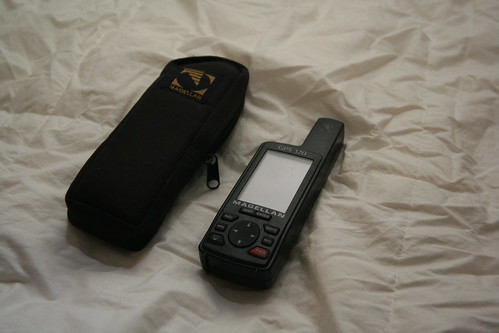From the Geocaching website: "Geocaching (pronounced gee-oh-cashing) is a worldwide game of hiding and seeking treasure. A geocacher can place a geocache in the world, pinpoint its location using GPS technology and then share the geocache's existence and location online. Anyone with a GPS device can then try to locate the geocache."
That was good because I had a GPS, so I started heading out to find caches whenever I could. As I travel a lot for work, this meant that I've visited caches from Chester to Milton-Keynes. It was always tricky in those early days however, as I was using a first generation Magellan marine GPS (shown below), a paper map and a notebook with details copied from the website. The co-ordinate references were given in a format that wasn't directly compatible with my GPS, so I had to convert them before I could go hunting.

Good times.
Ok, rubbish times. So bad, in fact that I pretty much gave up until 2010 having only found 30 or so caches. I found a couple along the way here and there, but mostly this game became dead to me.
Now that I'm using my iPhone and iPad for geocaching, the world is very, very different. It's awesome to be able to access the Internet and download information about local caches, while the GPS on the iPhone is far quicker and more accurate than that old Magellan ever was. Access to 'always on' online mapping technology from Google Maps and/or Bing means that finding a cache is a much better experience.
Now that I'm using my iPhone and iPad for geocaching, the world is very, very different. It's awesome to be able to access the Internet and download information about local caches, while the GPS on the iPhone is far quicker and more accurate than that old Magellan ever was. Access to 'always on' online mapping technology from Google Maps and/or Bing means that finding a cache is a much better experience.
What do you get out of caching? Well, it's true that there is no material gain from it. In fact, it costs you money in fuel, a GPS and shoe leather. But if you're a walker already, it can be a great way to find some new spots that you would never have otherwise visited. There are so many caches in a typical area that this game is open to anyone. I've been getting my kids to assist in finding caches, so they are learning about using maps, understanding aerial photos and so on.
No comments:
Post a Comment